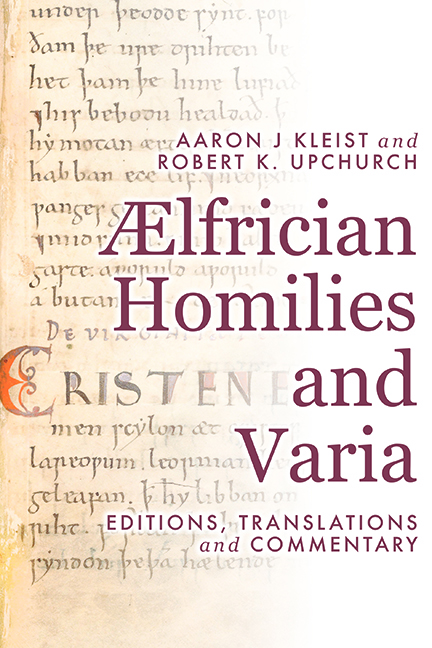Book contents
- Frontmatter
- Contents
- Preface
- Acknowledgements
- Abbreviations
- Sigla for Cited Ælfrician Manuscripts
- Dates for Cited Ælfrician Works
- Editorial Conventions
- Conventions Used in the Commentaries
- Homilies The Proper of the Season
- Homilies The Proper of the Saints
- Ælfrician Homilies and Varia: Editions, Translations, and Commentary: Volume II
- Homilies The Common of the Saints
- Homilies Unspecified Occasions
- Varia
- Works Cited
- Index
- ANGLO-SAXON TEXTS
23 - Mæsse Creda (‘The Mass Creed’) [Nicene Creed]
Published online by Cambridge University Press: 05 March 2024
- Frontmatter
- Contents
- Preface
- Acknowledgements
- Abbreviations
- Sigla for Cited Ælfrician Manuscripts
- Dates for Cited Ælfrician Works
- Editorial Conventions
- Conventions Used in the Commentaries
- Homilies The Proper of the Season
- Homilies The Proper of the Saints
- Ælfrician Homilies and Varia: Editions, Translations, and Commentary: Volume II
- Homilies The Common of the Saints
- Homilies Unspecified Occasions
- Varia
- Works Cited
- Index
- ANGLO-SAXON TEXTS
Summary
Ælfric's Mæsse Creda (‘Mass Creed’) is a close translation of the Latin Niceno-Constantinopolitan Creed (traditionally called the Nicene Creed) recited at the consecration of the Eucharist, and it is the second confession of faith he supplies for the clergy to teach lay Christians. Like his translation of the Apostles’ Creed, Se Læssa Creda (AH II.22), the Mæsse Creda contains professions of faith in the Trinity, the Church, the forgiveness of sins, the resurrection of the dead, and eternal life. Several years before translating the Mass Creed in 992, he drew on its tenets for his creedal sermon in the Catholic Homilies (989), so it is not surprising to find it alongside the Pater noster and Se Læssa Creda in Cambridge, University Library, Gg. 3. 28 [K], a manuscript Ælfric assembled for priests. A creed, either the Apostles’ or the Nicene Creed, and the Lord's Prayer were, in the eyes of Ælfric and his contemporaries and predecessors, fundamental to the practice of the faith. It is surprising, then, that Ælfric's text is the only Old English version of the Nicene Creed to survive. Perhaps the relative length and theological complexity of the Mass Creed made it less appealing to the priests who had to teach it and to the laypeople who had to learn it. Or perhaps the use of the Apostles’ Creed at baptisms made the Nicene Creed the less popular choice to teach. As was mentioned in the previous chapter, Archbishop Wulfstan certainly knew the Nicene Creed, but he chose to translate the Apostles’ Creed in his sermon for the laity, and Ælfric's Lord's Prayer circulates only with his version of the Apostles’ Creed. The only copy of the Mæsse Creda to survive outside of K appears by itself on a single leaf that was added to the collection of homilies preserved in Oxford, Bodleian Library, Hatton 114 [T2] soon after it was made between 1064 and 1083 for Bishop Wulfstan II (1062–95). The presence of the creed in the homiliary of an active preacher who traveled throughout his diocese on ‘pastoral tours’ suggests that St Wulfstan saw a role for Ælfric's Mæsse Creda in his robust program of pastoral care.
- Type
- Chapter
- Information
- Ælfrician Homilies and VariaEditions, Translations, and Commentary, pp. 945 - 964Publisher: Boydell & BrewerPrint publication year: 2022

